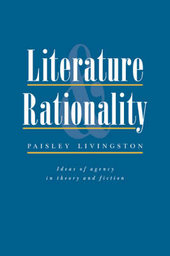
|
Literature and Rationality: Ideas of Agency in Theory and Fiction
Paperback / softback
Main Details
| Title |
Literature and Rationality: Ideas of Agency in Theory and Fiction
|
| Authors and Contributors |
By (author) Paisley Livingston
|
| Physical Properties |
| Format:Paperback / softback | | Pages:268 | | Dimensions(mm): Height 229,Width 151 |
|
| Category/Genre | Literary theory |
|---|
| ISBN/Barcode |
9780521064804
|
| Classifications | Dewey:801 |
|---|
| Audience | | Professional & Vocational | |
|---|
| Illustrations |
Worked examples or Exercises
|
|
Publishing Details |
| Publisher |
Cambridge University Press
|
| Imprint |
Cambridge University Press
|
| Publication Date |
12 June 2008 |
| Publication Country |
United Kingdom
|
Description
This interdisciplinary study establishes connections between divergent approaches to rationality in philosophy, social science, and literary studies. Livingston provides a broad survey of the basic assumptions and questions associated with concepts of rationality in philosophical accounts of action, in decision theory, and in the theory of rational choice. He gives examples of the ways in which rationality is involved in the writing and reading of literary works, ranging from Icelandic sagas to Beckett, Dreiser, Lem, Poe and Zola. Topics examined include the role of concepts of desire, intention, and planning in action explanations, the relation between cognition and motivation, the rationality of desire, atomic versus agential perspectives on rationality, the rationality of groups and institutions, and the question of the rationality of science.
ReviewsFrom the hardback review: 'Paisley Livingston makes a novel and valuable contribution both to the study of literature and to the theory of rationality.' Jon Elster From the hardback review: 'A powerful plea for realist literary criticism that challenges the assumptions of such major critical trends as deconstructionism, semiotics, and cultural studies, and offers a convincing alternative to their claims. Well informed and well-argued, it touches crucial issues in a provocative way and offers an original alternative to the dominant modes of critical discourse.' Thomas Pavel
|